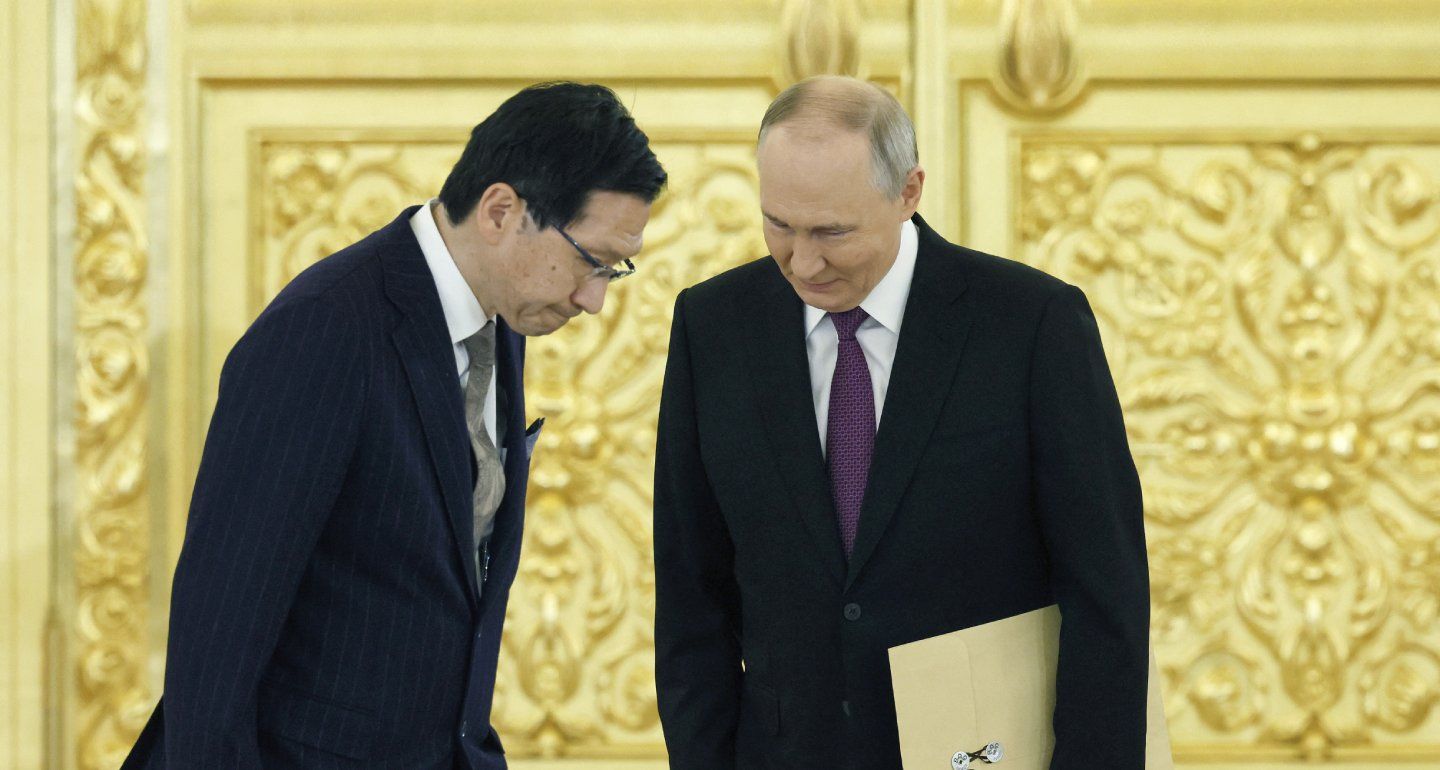The main source of Russian aggression is a profound mistrust of the West and the firm belief that it intends to inflict a “strategic defeat” on Russia. As long as this fear persists, the war will not end.
Tatiana Stanovaya
{
"authors": [
"James D.J. Brown"
],
"type": "commentary",
"blog": "Carnegie Politika",
"centerAffiliationAll": "",
"centers": [
"Carnegie Endowment for International Peace",
"Carnegie Russia Eurasia Center"
],
"englishNewsletterAll": "",
"nonEnglishNewsletterAll": "",
"primaryCenter": "Carnegie Russia Eurasia Center",
"programAffiliation": "",
"programs": [],
"projects": [],
"regions": [
"Russia",
"Japan"
],
"topics": [
"Foreign Policy",
"Global Governance",
"NATO",
"Security"
]
}
Source: Getty Images
Moscow would be wise to recognize that Japan is standing against Russian aggression and in support of the international system not because of U.S. pressure, but to defend itself.
Speaking to the Valdai Discussion Club on November 7, Russian President Vladimir Putin addressed Japan the way a schoolteacher might talk to a wayward child. He expressed bemused disappointment that Japan had imposed sanctions on Russia. However, he attributed this not to Japan’s own failings, but to the malign influence of the United States. Putin was therefore willing to be magnanimous and offer forgiveness if only Japan recognized the error of its ways. As for Japanese businesses, Putin promised, “we shall not engage in tomfoolery or assign undue blame. We are ready; we welcome your return, and that is all.”
Just one week later, Japan appeared to respond. Several Russian media outlets reported that Japan had begun to soften its sanctions. ABN24 published an article under the headline: “Putin outplayed Japan—Tokyo has started lifting its sanctions on Russia.”
To those eager to believe this narrative, Japan’s purported policy shift appeared to make sense. Donald Trump’s victory in the U.S. presidential election had changed the political climate. With the incoming Trump administration committed to cutting Ukraine’s “allowance” and pursuing engagement with Putin, it was surely now imperative for Tokyo to soften its own stance to fall in line with its U.S. ally.
Furthermore, Japan’s October 27 general election, in which the ruling Liberal Democratic Party (LDP) failed to win a majority, has left the government in a weak position. Struggling to lead a minority administration and with approval ratings of only 40 percent, Prime Minister Shigeru Ishiba has his hands full with domestic issues and will have little time for the distant Ukraine war.
While this argument might seem superficially convincing, it is wrong from start to finish. To begin with, the story about Japan lifting sanctions is false. Japan simply clarified its policy to spell out that mild hybrids—that is, cars that have both conventional engines and electric motors, but cannot operate exclusively on the latter—have never been subject to Japanese sanctions.
In fact, rather than soften its stance, Japan’s government has reaffirmed its position. Ishiba has promised to maintain sanctions on Russia. Furthermore, on October 17, Japanese Defense Minister Gen Nakatani joined a meeting of NATO defense ministers in Brussels and held talks with his Ukrainian counterpart Rustem Umerov. Nakatani promised to supply Ukraine with more second-hand Self-Defense Force (SDF) vehicles, adding to the 101 that Japan has already delivered.
In addition, Foreign Minister Takeshi Iwaya made a surprise visit to Kyiv on November 16. As well as repeating that “Japan is with Ukraine,” Iwaya signed an information security agreement that will make it easier for Japan and Ukraine to share classified intelligence. The sides also agreed to begin a high-level security policy dialogue. This will oversee implementation of the ten-year support and cooperation accord that Japan and Ukraine signed in June. Moreover, Iwaya announced the provision of more electricity generators to counteract the effects of Russia’s bombardment of Ukraine’s energy grid.
Officials in Moscow tend to assume that Japan’s hard line against Russia is the result of U.S. arm-twisting. If that were true, any decrease in pressure from Washington would indeed lead Japan to adopt a less hostile approach. But Tokyo’s strident opposition to Russia’s invasion of Ukraine is driven primarily by Japan’s own security imperatives, not U.S. pressure.
Japan is a relatively lightly armed democracy surrounded by authoritarian, nuclear-armed states. It is also a trading nation whose prosperity depends on the free flow of global commerce. This makes Japan especially invested in the post-1945 rules-based international order. Russia’s invasion of Ukraine, despite taking place 8,000 kilometers away, is regarded as a serious threat to Japan precisely because it challenges this international order. Tokyo fears that if Russia can get away with invading a sovereign country and changing the status quo by force, this will send the message that other powerful states are also free to impose their will on weaker neighbors.
Japan is especially worried that Russian aggression in Europe, if successful, could embolden China. This is why Prime Minister Ishiba and his predecessor Fumio Kishida have endlessly repeated that “today’s Ukraine could be tomorrow’s East Asia.” What they really mean is that Russian aggression in Ukraine must be shown to clearly fail in order to discourage China from moving militarily on Taiwan and thus sparking a conflict that would also engulf Japan.
A second factor explaining the resilience of Japanese policy is Russia’s own threatening behavior. Russia regularly sends military aircraft, including TU-95 strategic bombers, to approach Japanese airspace. Between April and June 2024, Japanese SDF jets scrambled to intercept Russian aircraft fifty-two times. On September 23, a Russian IL-38 patrol aircraft violated Japanese airspace on three occasions, forcing SDF jets to fire warning flares.
Russia’s saber-rattling is intended to intimidate Japan and deter Tokyo from actions that displease Moscow, but it has the opposite effect. By vividly demonstrating the threat that Russia poses, Moscow has inadvertently forced Japan to recognize the indivisibility of European and East Asian security and thereby encouraged Japan to deepen cooperation with NATO.
Other Russian actions have similarly stiffened Japanese resolve. Not surprisingly for a country with its tragic history, Japan has been horrified by the Putin regime’s nuclear rhetoric and lowering of the threshold for the use of nuclear weapons. In response, Japan’s Deputy Permanent Representative to the United Nations Mitsuko Shino condemned Russia as an aggressor, stated that “Japan will never accept Russia’s nuclear threats,” and repeated that “we continue to stand with Ukraine and uphold international law.”
This image of Russia as a rogue state has been strengthened by Moscow’s signing of a mutual defense treaty with Pyongyang and the deployment of North Korean troops to fight in Ukraine. It would be hard to exaggerate just how negatively North Korea is viewed in Japan. After all, the pariah state regularly fires ballistic missiles toward or even over the Japanese archipelago. The Pyongyang regime also has a record of abducting ordinary Japanese citizens, including a thirteen-year-old schoolgirl, and taking them to North Korea. The abductees issue is so prominent in Japan that many LDP politicians never appear publicly without a blue badge on their lapel symbolizing their commitment to this issue.
In addition, the Japanese government is deeply concerned about how Russia will repay North Korea for its manpower. Tokyo worries that North Korea will gain not only combat experience, but also military technology in the form of missiles, submarines, satellites, drones, and perhaps even nuclear technology. In short, in the eyes of Japanese policymakers, Moscow has abandoned all decency and is aiding and emboldening a terrorist state that poses a proven threat to Japan.
Finally, the weakness of the current government and the probable short tenure of Prime Minister Ishiba is unlikely to have much impact on Japan’s Russia policy.
The rapid turnover of Japanese prime ministers is nothing new. Japan had seven different leaders between 2006 and 2012. While this is not ideal, Japan has a highly professional bureaucracy that will ensure continuity of governance. Specifically, since Japan’s policy of supporting Ukraine and sanctioning Russia is already fully up and running, the country’s bureaucrats will simply continue implementing these policies even in the absence of strong political leadership.
If Ishiba falls, there is no conceivable replacement who would take a more pro-Russian stance. Unlike in several Western countries, there are no leading politicians in Japan or populist movements with mass support that advocate abandoning Ukraine and embracing Putin.
The Russian lobby’s apparent weakness is embodied in the figure of former prime minister Yoshiro Mori, who has been a tireless advocate of closer relations with Russia. After Russia’s full-scale invasion of Ukraine in 2022, Mori blamed Kyiv for the war and criticized Ukrainian President Volodymyr Zelensky for making his people suffer. However, Mori has become a marginal figure, known more for his rhetorical gaffes than for his political influence. He is also eighty-seven years old and in poor health. Mori told a political gathering in October that it was likely to be his last public appearance. When he exits the scene, there will be no pro-Russian figure of comparable stature to take his place.
Overall, despite being buffeted by external and internal turbulence, Japan’s policies regarding Russia are likely to remain on course. Indeed, far from easing sanctions, Japanese media reported on November 18 that the government is considering the introduction of yet tougher measures. Moscow would be wise to recognize that Japan is standing against Russian aggression and in support of the international system not because of U.S. pressure, but to defend itself.
Carnegie does not take institutional positions on public policy issues; the views represented herein are those of the author(s) and do not necessarily reflect the views of Carnegie, its staff, or its trustees.
The main source of Russian aggression is a profound mistrust of the West and the firm belief that it intends to inflict a “strategic defeat” on Russia. As long as this fear persists, the war will not end.

Tatiana Stanovaya
The Russian army is not currently struggling to recruit new contract soldiers, though the number of people willing to go to war for money is dwindling.

Dmitry Kuznets
Insisting on Zelensky’s resignation is not just a personal vendetta, but a clear signal that the Kremlin would like to send to all its neighbors: even if you manage to put up some resistance, you will ultimately pay the price—including on a personal level.

Vladislav Gorin
For Putin, upgrading Russia’s nuclear forces was a secondary goal. The main aim was to gain an advantage over the West, including by strengthening the nuclear threat on all fronts. That made growth in missile arsenals and a new arms race inevitable.

Maxim Starchak
For a real example of political forces engaged in the militarization of society, the Russian leadership might consider looking closer to home.

James D.J. Brown